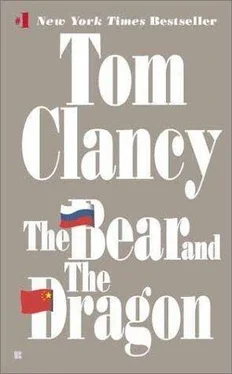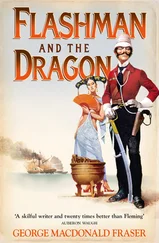Tom Clancy - The Bear and the Dragon
Здесь есть возможность читать онлайн «Tom Clancy - The Bear and the Dragon» весь текст электронной книги совершенно бесплатно (целиком полную версию без сокращений). В некоторых случаях можно слушать аудио, скачать через торрент в формате fb2 и присутствует краткое содержание. Год выпуска: 2001, ISBN: 2001, Жанр: Триллер, на английском языке. Описание произведения, (предисловие) а так же отзывы посетителей доступны на портале библиотеки ЛибКат.
- Название:The Bear and the Dragon
- Автор:
- Жанр:
- Год:2001
- ISBN:780425180969
- Рейтинг книги:3 / 5. Голосов: 1
-
Избранное:Добавить в избранное
- Отзывы:
-
Ваша оценка:
- 60
- 1
- 2
- 3
- 4
- 5
The Bear and the Dragon: краткое содержание, описание и аннотация
Предлагаем к чтению аннотацию, описание, краткое содержание или предисловие (зависит от того, что написал сам автор книги «The Bear and the Dragon»). Если вы не нашли необходимую информацию о книге — напишите в комментариях, мы постараемся отыскать её.
The Bear and the Dragon — читать онлайн бесплатно полную книгу (весь текст) целиком
Ниже представлен текст книги, разбитый по страницам. Система сохранения места последней прочитанной страницы, позволяет с удобством читать онлайн бесплатно книгу «The Bear and the Dragon», без необходимости каждый раз заново искать на чём Вы остановились. Поставьте закладку, и сможете в любой момент перейти на страницу, на которой закончили чтение.
Интервал:
Закладка:
“Well?”
“Well, he told me to shove it up my ass-in diplo-speak,” Hitch told his visitor. “You might have a lively session this morning.”
Rutledge had seen the note already, of course. “I’m surprised Scott let it go out that way.”
“I gather things at home have gotten a little firm. We’ve seen CNN and all, but maybe it’s even worse than it appears.”
“Look, I don’t condone anything the Chinese did, but all this over a couple of shot clergymen …”
“One was a diplomat, Cliff,” Hitch reminded him. “If you got your ass shot off, you’d want them to take it seriously in Washington, wouldn’t you?”
The reprimand made Rutledge’s eyes flare a little. “It’s President Ryan who’s driving this. He just doesn’t understand how diplomacy works.”
“Maybe, maybe not, but he is the President, and it’s our job to represent him, remember?”
“Hard to forget it,” Rutledge groused. He’d never be Undersecretary of State while that yahoo sat in the White House, and Undersecretary was the job he’d had his eye on for the last fifteen years. But neither would he get the job if he allowed his private feelings, however justified, to cloud his professional judgment. “We’re going to be called home or sent home,” he estimated.
“Probably,” Hitch agreed. “Be nice to catch some baseball. How do the Sox look this season?”
“Forget it. A rebuilding year. Once again.”
“Sorry about that.” Hitch shook his head and checked his desk for new dispatches, but there were none. Now he had to let Washington know what the Chinese Foreign Minister had said. Scott Adler was probably sitting in his seventh-floor office waiting for the secure direct line to ring.
“Good luck, Cliff.”
“Thanks a bunch,” Rutledge said on his way out the door.
Hitch wondered if he should call home and tell his wife to start packing for home, but no, not yet. First he had to call Foggy Bottom.
So, what’s going to happen?” Ryan asked Adler from his bed. He’d left orders to be called as soon as they got word. Now, listening to Adler’s reply, he was surprised. He’d thought the wording of the note rather wimpy, but evidently diplomatic exchange had even stricter rules than he’d appreciated. ”Okay, now what, Scott?”
“Well, we’ll wait and see what happens with the trade delegation, but even money we call them and Carl Hitch home for consultations.”
“Don’t the Chinese realize they could take a trade hit from all this?”
“They don’t expect that to happen. Maybe if it does, it’ll make them think over the error of their ways.”
“I wouldn’t bet much on that card, Scott.”
“Sooner or later, common sense has to break out. A hit in the wallet usually gets a guy’s attention,” SecState said.
“I’ll believe that when I see it,” POTUS replied. “’Night, Scott.”
“’Night, Jack.”
“So what did they say?” Cathy Ryan asked.
“They told us to stick it up our ass.”
“Really?”
“Really,” Jack replied, flipping the light off.
The Chinese thought they were invincible. It must be nice to believe that. Nice, but dangerous.
The 265th Motor Rifle Division was composed of three regiments of conscripts-Russians who hadn’t chosen to avoid military service, which made them patriotic, or stupid, or apathetic, or sufficiently bored with life that the prospect of two years in uniform, poorly fed and largely unpaid, didn’t seem that much of a sacrifice. Each regiment was composed of about fifteen hundred soldiers, about five hundred fewer than full authorized strength. The good news was that each regiment had an organic tank battalion, and that all of the mechanized equipment was, if not new, then at least recently manufactured, and reasonably well maintained. The division lacked its organic tank regiment, however, the fist which gave a motor-rifle division its offensive capabilities. Also missing was the divisional antitank battalion, with its Rapier antitank cannons. These were anachronistic weapons which Bondarenko nonetheless liked because he’d played with them as an officer cadet nearly forty years before. The new model of the BMP infantry carrier had been modified to carry the AT-6 antitank missle, the one NATO called “Spiral,” actually a Russian version of the NATO Milan, courtesy of some nameless KGB spy of the 1980s. The Russian troops called it the Hammer for its ease of use, despite a relatively small warhead. Every BMP had ten of these, which more than made up for the missing battalion of towed guns.
What worried Bondarenko and Aliyev most was the lack of artillery. Historically the best trained and best drilled part of the Russian army, the artillery was only half present in the Far East’s maneuver forces, battalions taking the place of regiments. The rationale for this was the fixed defense line on the Chinese border, which had a goodly supply of fixed and fortified artillery positions, albeit of obsolete designs, though with trained crews and massive stocks of shells to pour into predetermined positions.
The general scowled in the confines of his staff car. It was what he got for being smart and energetic. A properly prepared and trained military district didn’t need a man like him, did it? No, his talents were needed by a shithole like this one. Just once, he thought, might a good officer get a reward for good performance instead of another “challenge,” as they called it? He grunted. Not in this lifetime. The dunces and dolts drew the comfortable districts with no threats and lots of equipment to deal with them.
His worst worry was the air situation. Of all the Russian military arms, the air forces had suffered the most from the fall of the Soviet Union. Once Far East had had its own fleets of tactical fighters, poised to deal with a threat from American aircraft based in Japan or on aircraft carriers of their Pacific Fleet, that plus what was needed to face off the Chinese. No more. Now he had perhaps fifty usable aircraft in theater, and the pilots for those got perhaps seventy flight hours per year, barely enough to make sure they could take off and land safely. Fifty modern fighter-class aircraft, mainly for air-to-air combat, not air-to-ground. There were several hundred more, rotting at their bases, mainly in hardened shelters to keep them dry, their tires dry-rotted and internal seals cracked from lack of use because of the spare-parts shortage that grounded nearly the entire Russian air force.
“You know, Andrey, I can remember when the world shook with fear of our country’s army. Now, they shake with laughter, those who bother to take note of us.” Bondarenko took a sip of vodka from a flask. It had been a long time since he’d drunk alcohol on duty, but it was cold-the heater in the car was broken-and he needed the solace.
“Gennady Iosifovich, it is not as bad as it appears-”
“I agree! It is worse!” CINC-FAR EAST growled. “If the Chinks come north, I shall learn to eat with chopsticks. I’ve always wondered how they do that,” he added with a wry smile. Bondarenko was always one to see the humor in a situation.
“But to others we appear strong. We have thousands of tanks, Comrade General.”
Which was true. They’d spent the morning inspecting monstrous sheds containing of all things T-34/85 tanks manufactured at Chelyabinsk in 1946. Some had virgin guns, never fired. The Germans had shaken in their jack-boots to see these tanks storm over the horizon, but that’s what they were, World War II tanks, over nine hundred of them, three complete division sets. And there were even troops to maintain them! The engines still turned over, serviced as they were by the grand children of the men who’d used them in combat operations against the fascisti. And in the same sheds were shells, some made as recently as 1986, for the 85-mm guns. The world was mad, and surely the Soviet Union had been mad, first to store such antiques, then to spend money and effort maintaining them. And even now, more than ten years after the demise of that nation-state, the sheer force of bureaucratic inertia still sent conscripts into the sheds to maintain the antique collection. For what purpose? No one knew. It would take an archivist to find the documents, and while that might be of interest to some historian of a humorous bent, Bondarenko had better things to do.
Читать дальшеИнтервал:
Закладка:
Похожие книги на «The Bear and the Dragon»
Представляем Вашему вниманию похожие книги на «The Bear and the Dragon» списком для выбора. Мы отобрали схожую по названию и смыслу литературу в надежде предоставить читателям больше вариантов отыскать новые, интересные, ещё непрочитанные произведения.
Обсуждение, отзывы о книге «The Bear and the Dragon» и просто собственные мнения читателей. Оставьте ваши комментарии, напишите, что Вы думаете о произведении, его смысле или главных героях. Укажите что конкретно понравилось, а что нет, и почему Вы так считаете.






![Александр Ирвин - Tom Clancy’s The Division 2. Фальшивый рассвет [litres]](/books/417744/aleksandr-irvin-tom-clancy-s-the-division-2-falsh-thumb.webp)




